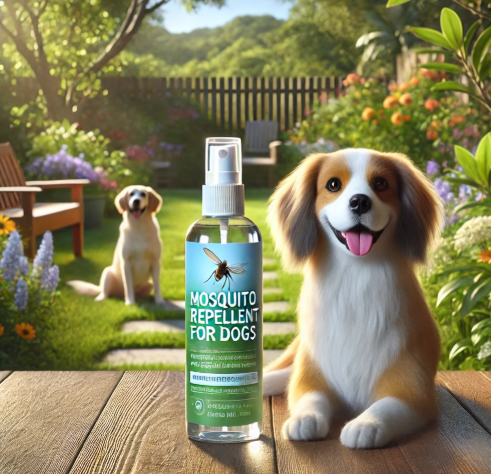Mosquitoes are more than just a nuisance—they can pose serious health risks to dogs. These tiny pests are carriers of diseases like heartworm, West Nile virus, and other harmful infections that can affect your furry friend’s well-being. With the right mosquito repellent for dogs and proactive measures, you can keep your pet safe, comfortable, and bite-free.
We will guide you through the importance of mosquito prevention for dogs, the types of repellents available, and practical tips to protect your pet effectively.
Why is Mosquito Prevention for Dogs Crucial?
Mosquito bites can be more than just itchy for dogs. Here’s why protecting your pet is essential:
1. Risk of Heartworm Disease
Heartworm is a potentially fatal condition caused by parasites transmitted through mosquito bites. Once inside the dog’s body, these worms grow and multiply, damaging the heart, lungs, and other vital organs. Regular use of a reliable mosquito repellent for dogs is the first line of defense against this dangerous disease.
2. Skin Irritation and Allergies
Mosquito bites can cause itching, redness, and irritation in dogs, particularly in areas with thin fur. Some dogs may even develop allergic reactions, leading to excessive scratching and skin infections.
3. Transmission of Other Diseases
Apart from heartworm, mosquitoes can carry other diseases like West Nile virus and certain types of encephalitis, which may also affect dog’s health and wellness.
Types of Mosquito Repellent for Dogs
There are several options for mosquito prevention for dogs, ranging from topical treatments to natural remedies. Here’s an overview:
1. Topical Repellents
Topical solutions like sprays, creams, and wipes are commonly used as insect repellent for dogs. These are easy to apply and provide immediate protection. Look for products specifically labeled safe for pets, as human repellents may contain harmful chemicals like DEET.
2. Collars
Mosquito repellent collars are infused with active ingredients that repel mosquitoes and other insects. They offer long-lasting protection, typically lasting several months, and are ideal for dogs who spend a lot of time outdoors.
3. Oral Medications
Veterinarian-prescribed oral medications can prevent mosquito-borne diseases like heartworm. While these don’t repel mosquitoes directly, they protect your dog from the infections caused by bites.
4. Natural Remedies
Natural options like essential oils (e.g., citronella, lemongrass, or lavender) can be effective in repelling mosquitoes. However, always dilute essential oils and consult your vet before use to ensure they are safe for your pet.
Choosing the Best Mosquito Repellent for Dogs
When selecting a repellent, prioritize your dog’s safety and comfort. Here are some tips to find the best mosquito repellent for dogs:
- Check Ingredients: Avoid products containing DEET or permethrin, which are toxic to dogs. Opt for pet-safe formulations with active ingredients like pyrethrin or natural oils.
- Consider Your Dog’s Lifestyle: For outdoor-loving dogs, long-lasting options like collars or spot-on treatments may be more practical.
- Age and Health Considerations: Puppies, senior dogs, and pets with health conditions may require milder, vet-approved repellents.
- Ease of Application: Choose a product that’s convenient for your routine, whether it’s a spray, wipe, or collar.
Tips for Effective Mosquito Prevention for Dogs
1. Create a Mosquito-Free Environment
- Remove standing water from your yard, as it serves as a breeding ground for mosquitoes.
- Keep your dog’s outdoor space clean and well-maintained.
- Use pet-safe mosquito repellents in your yard, such as sprays or mosquito traps.
2. Limit Outdoor Exposure During Peak Times
Mosquitoes are most active at dawn and dusk. Try to keep your dog indoors during these times to reduce their risk of bites.
3. Use Protective Clothing
Lightweight, breathable clothing designed for dogs can help shield their skin from mosquito bites, especially during walks or outdoor play.
4. Regular Vet Checkups
Schedule routine checkups to ensure your dog is free from mosquito-borne diseases. Heartworm testing and preventive medications should be part of their care plan.
5. Apply Repellent Properly
Follow the instructions on the product label to ensure the repellent is applied effectively. Avoid contact with your dog’s eyes, nose, and mouth.
FAQs About Mosquito Repellent for Dogs
1. Can I Use Human Mosquito Repellent on My Dog?
No. Human repellents often contain DEET or other chemicals that are toxic to dogs. Always use products specifically designed for pets.
2. Are Natural Repellents Safe for Dogs?
Some natural repellents, like citronella or lavender, can be effective but should be used with caution. Always dilute essential oils and consult your vet before applying them to your dog.
3. How Often Should I Use Mosquito Repellent on My Dog?
The frequency depends on the product. Some sprays require reapplication every few hours, while collars and spot-on treatments can last for weeks or months.
Final Thoughts: Protecting Your Dog from Mosquitoes
Keeping your dog safe from mosquitoes is an essential part of responsible pet care. With the right mosquito repellent for dogs, proactive environmental changes, and regular vet care, you can reduce the risk of mosquito bites and the diseases they carry.
Whether you choose sprays, collars, or natural remedies, make sure to use pet-safe products that align with your dog’s needs and lifestyle. By prioritizing mosquito prevention for dogs, you’re giving your furry friend the protection they deserve for a happy, healthy life.
FAQs
- What types of mosquito repellents are safe for dogs?
Safe mosquito repellents for dogs include natural options made with essential oils like eucalyptus, geranium, and rosemary. Products like K9 Advantix II and Vectra 3D provide effective chemical protection but should be used cautiously around cats. - How often should I apply mosquito repellent on my dog?
The frequency of application depends on the product used. Natural sprays may need reapplication every 1.5 to 2 hours, while topical treatments like K9 Advantix II can provide protection for up to 30 days. - Are there any ingredients I should avoid in dog mosquito repellents?
Avoid using products containing DEET or citronella, as these can be harmful to dogs. Always check the label for safe ingredients before applying any repellent. - Can I use human mosquito repellent on my dog?
No, human mosquito repellents are not safe for dogs and can cause adverse reactions. Always use products specifically formulated for pets to ensure their safety. - What are the signs that a mosquito repellent is causing a reaction in my dog?
Signs of a reaction may include itching, redness, swelling, or excessive licking at the application site. If you notice any of these symptoms, discontinue use and consult your veterinarian immediately.









